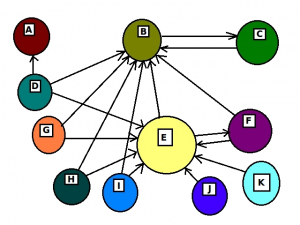Link Impacts
Recent Google algorithm updates have put webmasters on alert as to why their sites may have lost ranking—or proactively looking for ways to avoid future penalties. Link profiles play a prominent role in a website’s PageRank, so it’s important to know how different types of links can impact your website.
Here are a few types of inbound that can help your SERP rankings:
- Links from highly trusted sites: sites that have a strong ranking and offer relevant information related to your industry or product
- Resource links: links to and/or from sites with quality, relevant content
- High number of links: while you don’t want to overdo it, your site should have a healthy, natural balance of links (incoming and outgoing) and supporting content
 Partial keyword match links: too many exact match keywords in the anchor text of incoming links will hurt your ranking.
Partial keyword match links: too many exact match keywords in the anchor text of incoming links will hurt your ranking.- Forum signature and blog comment links: this method of leaving links to your site on relevant forums and blogs can quickly increase your incoming link totals, as well as provide you with engaged traffic
Having these incoming links can and likely will bolster your link profile, but how you get them may make an even greater difference. Each of these linking strategies can hurt your SERP if not done correctly:
- Links to high-ranking, low-quality sites: While Google continues to clean out spam sites, some have persisted beyond the algorithm updates and hold higher-than-deserved rankings. If a site ranks well but features low-quality or spammy content, then avoid building a link relationship with that site.
- Irrelevant resource links: Links to and/or from sites that contain minimal information, overly vague content or irrelevant information weaken your link profile. Even if those sites have high traffic, you may be penalized.
- Too many incoming links: Did you pay a company to give you 1,000 incoming links from some unknown destination or ask every other site you visit to link to you, regardless of what the site is about? A warning: too many incoming links throw off the natural balance Google is looking for.
- Spamming forums and blogs: I’m sure you’ve seen the spam comments on blogs that begin, “This was a great article. I found my girlfriend at this free site called…” If the forum or blog offers irrelevant content, or if either has developed an HTML that creates nofollow links (which keeps Google spiders from crawling the content), then you will reap no rewards.
- Links from sites that no longer exist: If a valuable site linking to you shuts down, then your links will become dead ends and you may lose ranking. If a site you share links with announces that it is shutting down, reach out to the owner and ask him/her to leave the site up in its dormant state, especially if there is relevant content that may help your customers.
- Purchased links: Buying your way to the top is never a healthy solution, and Google’s Panda and Penguin updates have been helping take care of sites that use such tactics. These updates will especially hurt if you’ve paid to have spam sites link to you.
- Links from directories: While these links don’t actually hurt, they also don’t help. Seek to get your website into relevant, high-traffic directories in order to benefit your overall traffic, but don’t expect those links to increase your ranking.
At the end of the day, your goal should be to build a link profile that resonates with your customers—help them easily solve the question or problem that drove them to the web in the first place. Do this by building relationships with credible websites and virtual “neighborhoods” with quality content that’s relevant to your website. Keep your industry, products and, most importantly, customers in mind when developing a link strategy, and your profile is bound to develop in a natural—and Google-approved—way.
Harvin Bedenbaugh – Project Manager



